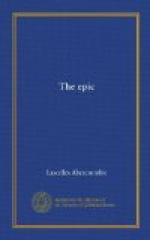Epic poetry, then, was invented to supply the artistic demands of society in a certain definite and recognizable state. Or rather, it was the epic material which supplied that; the first epic poets gave their age, as genius always does, something which the age had never thought of asking for; which, nevertheless, when it was given, the age took good hold of, and found that, after all, this, too, it had wanted without knowing it. But as society went on towards civilization, the need for epic grew less and less; and its preservation, if not accidental, was an act of conscious aesthetic admiration rather than of unconscious necessity. It was preserved somehow, however; and after other kinds of literature had arisen as inevitably and naturally as epic, and had become, in their turn, things of less instant necessity than they were, it was found that, in the manner and purpose of epic poetry, something was given which was not given elsewhere; something of extraordinary value. Epic poetry would therefore be undertaken again; but now, of course, deliberately. With several different kinds of poetry to choose from, a man would decide that he would like best to be an epic poet, and he would set out, in conscious determination, on an epic poem. The result, good or bad, of such a determination is called “literary” epic. The poems of Apollonius Rhodius, Virgil, Lucan, Camoens, Tasso and Milton are “literary” epics. But such poetry as the Odyssey, the Iliad, Beowulf, the Song of Roland, and the Nibelungenlied, poetry which seems an immediate response to some general and instant need in its surrounding community—such poetry is “authentic” epic.
A great deal has been made of this distinction; it has almost been taken to divide epic poetry into two species. And, as the names commonly given to the two supposed species suggest, there is some notion that “literary” epic must be in a way inferior to “authentic” epic. The superstition of antiquity has something to do with this; but the presence of Homer among the “authentic” epics has probably still more to do with it. For Homer is the poet who is usually chosen to stand for “authentic” epic; and, by a facile association of ideas, the conspicuous characteristics of Homer seem to be the marks of “authentic” epic as a species. It is, of course, quite true, that, for sustained grandeur and splendour, no poet can be put beside Homer except Dante and Milton; but it is also quite clear that in Homer, as in Dante, and Milton, such conspicuous characteristics are simply the marks of peculiar poetic genius. If we leave Homer out, and consider poetic greatness only (the only important thing to consider), there is no “authentic” epic which can stand against Paradise Lost or the Aeneid. Then there is the curious modern feeling—which is sometimes but dressed up by erroneous aesthetic theory (the worship of a quite national “lyricism,” for instance) but which is really nothing but a sign of covert barbarism—that lengthy poetic composition is somehow undesirable; and Homer is thought to have had a better excuse for composing a long poem than Milton.




